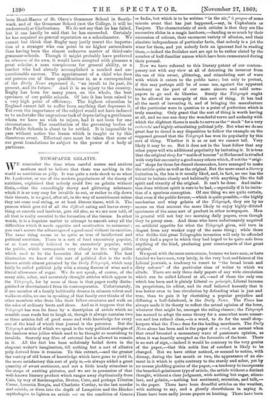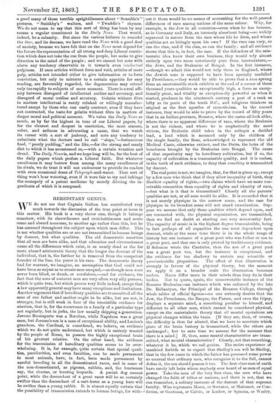NEWSPAPER GELATIN.
WE remember the time when careful nurses and anxious mothers used to believe that there was nothing in the world so nutritious as jelly. It was quite a rude shock to us when Dr. Laukester, or one of the modern popularizers of the theory of nutrition, explained that nobody could live on gelatin without fibrin,—that the exceedingly showy and glittering substance which it is so very easy for invalids to eat, or rather to slip down their throats, is no good, after all, in the way of nourishment unless they eat some real string, or at least fibrous tissue, with it. The process which gets rid of all the difficult eating and leaves every- thing so smooth and lambent, gets rid also, so We are now told, of all that is really essential to the formation of the tissues. In other words, it is a hopeless matter to attempt to smooth away all the difficulties which it needs appetite and mastication to surmount ; you can't secure the advantages of a good meal without its exertion. The same thing seems to be quite as true of intellectual and political nutrition. There is a sort of food excessively popular, or at least usually believed to be excessively popular, with the public, which corresponds very closely to the winy jellies which used to be the favourite diet of invalids. The best illustration we know of this sort of political diet is the well- known article almost patented by the Daily Telegraph, which may fairly be called political jelly with a strong flavour of wine and a liberal allowance of sugar. We do not speak, of course, of the many able, sober, and accurately-thought articles which appear in the Telegraph, for by none of these is that paper really distin- guished or discriminated from its contemporaries. Unfortunately, if one member of a family habitually dresses in crimson velvet and walks on stilts, no one in speaking of that family ever thinks of the other members who dress like their fellow-creatures and walk on the soles of ordinary boots and shoes. And so it happens that the Telegraph has won its fame by a description of article which no sensible man reads but to laugh at, though it always contains two or three articles full of good sense and wide knowledge for every one of the kind of which that journal is the patentee. But the Telegraph article of which we speak is the very political analogue of the luscious wine jellies which used to be thought so nourishing to invalids. Scarcely any fibre of external fact is allowed to remain in it. All the fact has been sedulously boiled down in the eloquent writer's imagination, till nothing but a sort of allusive pulp derived from it remains. To this extract,—and the greater the variety of old bones of knowledge which have gone to yield it, the more satisfactory this sort of pulp is,—is always added a great quantity of sweet sentiment, and not a little heady stimulant in the shape of exciting pictures, and we are in possession of that well-known literary product which ranges away rhythmically from Cain, by way of Sardanapalus, Brutus, Cato, and perhaps Tiberius Czesar, Lucretia Borgia, and Charlotte Corday; to the last murder and suicide, or dives into the depth of Lempriere and the Hindoo mythologies to lighten an article not on the condition of Greece or India, but which is to be written "in the air," apropos of some minute event that has just happened,—say, in Cephalonia or Tanjore. The characteristic of such articles is that they are like successive slides in a magic lanthorn,—dazzling us so much by their succession of colours, their enormous variety of allusion, and their absolute independence of particular facts, that nobody is a jot the wiser for them, and yet nobody feels an ignorant fool in reading them,—indeed the foolisher sort are apt to be rather elated by the number of half-familiar names which have been enumerated during their perusal.
Now we have referred to this literary patent of our contem- porary not with any view at all of deterring its inventor from the use of this sweet, glittering, and stimulating sort of ware with which it caters to the public taste; but only to protest, if this may perhaps still be of some use, against the apparent tendency on the part of our more sincere and solid news- papers to go and do likewise. Surely the Telegraph ought to be allowed its monopoly of this sort of thing. It has had all the merit of inventing it, and of bringing the manufacture of the particular ware in question to a point of perfection which is truly amazing. Only grant that the sort of thing is worth having at all, and no one can deny the wonderful verve and audacity with which the slightest theme is made to serve as the " stock " for a very recherché and highly-stimulating political jelly. But what we do see great fear to dread is any disposition to follow the example on the supposed ground that the Telegraph has won its popularity by this sort of thing. Whether it is so or not we cannot tell. Very likely it may be so. But it does not in the least follow that any other paper will win additional popularity by imitating it. It is true that the original shop for "maids of honour" at Richmond is rivalled with very fair success by a good many others which, if not the " origi- nal " shops for those far-famed cheesecakes, have managed to make the article quite as well as the original. But the more exact a literary imitation is, the less is it usually liked, and, in fact, no one has the talent to imitate closely and habitually with anything like the full spirit and vivacity of the original. It can't be done. And imita- tion done without spirit is sure to be bad,—especially if it be imita- tion of a spurious conception. Of one thing we are quite certain, that even if .the public favour,—which is quite possible,—the highly saccharine and winy gelatin of the Telegraph, they are by no means on that account the more likely to enjoy highly-diluted specimens of the same sort of product in other newspapers. Men in general will not buy two morning daily papers, even though they be penny ones. And those who have unfortunately acquired an artificial appetite for what the Telegraph gives, will turn in disgust from any weaker copy of the same thing ; while those who dislike this great Telegraphic invention will only be offended if they find a paper in which they had hoped to be quite safe from anything of the kind, producing poor counterparts of that great original.
We speak with the more earnestness, because we have seen, or have fancied we have seen, very lately, in the very best and fairest of the Liberal journals, a tendency to resort to "the broad brush and dirty colours" of the particular class of writer to which we allude. There are only three daily papers of any wide circulation which can be called Liberal at all,—and of these the only one which has been and is plainly Liberal on principle, Liberal because its proprietors, its editor, and its staff believed honestly that it was better even to lose circulation by defending what is just and true, than to gain it by cherishing a popular prejudice and diffusing a half-falsehood, is the Daily News. The Times has always made it its theory to reflect the actual opinion of the hour, whatever that might be, amongst the ruling classes ; the Telegraph has seemed to adopt the same theory for a somewhat more numer- ous and lass refined class,—in a word, to do for the small shop- keepers what the Times does for the leading merchants. The Daily News alone has been and is the paper of a creed, as earnest when that creed breasted a momentary wave of passionate opinion, as when it was heartily accepted as the favourite of the hour. There is no sort of sign,—indeed it would be contrary to the very genius of the paper,—that this noble line of conduct is likely to be changed. But we have either noticed, or seemed to notice, with dismay, during the last month or two, the appearance of an ele- ment in it which is quite contrary to the sturdy and sober, yet by no means plodding genius of the paper, —a tendency to incorporate the brandied-gelatinous type of article, the article without a distinct thought, without a clear judgment, with nothing but sugar, stimu- lant, and gelatin,—nothing but sentiment, sensation, and talk,— in the paper. There have been dreadful articles on the weather, with nothing to say, and a ghastly cheerfulness in saying it. There have been sadly jocose papers on hunting. There have been a good many of those terrible sprightlinessee about " Scumble's " pictures, " Smithby's " waltzes, and " Twaddle's " rhymes. We do not mean to say that this sort of thing has been by any means a regular constituent in the Daily News. That would, indeed, be a calamity. But since the various failures to remodel the Star, and its decease, we have read the News with a good deal of anxiety, because we have felt that on the News must depend for the future the representation of all strong and deep Liberal convic- tion which does not take the cue from the people, but seeks to give direction to the mind of the people ; and we cannot but note with alarm any tendency observable in it towards even intellectual pulpiness. If once articles without form and void, articles of mere pulp, articles not intended either to give information or to form conviction, but only to minister to a certain appetite for easy reading, are favourably regarded, the degeneration may extend only too rapidly to subjects of more moment. There is a real affi- nity between disregard of intellectual outline and accuracy, and disregard of moral outline and accuracy. Gelatin without fibre in matters intellectual is rarely relished or willingly manufac- tured except by those who can easily contract, even if they have not contracted, the taste for gelatin without fibre in matters of deeper moral and political moment. We value the Daily News so much, as by far the highest in tone of our Liberal papers, by far the clearest and deepest in conviction, the most sincere, sober, and arduous in advocating a cause, that we watch its career with a sort of jealousy, and note any tendency to substitute what the doctors used to call "slops,"—.farinaceous food, "poorly pudding," and the like,—for the strong and manly diet to which it has accustomed us,—with a certain vexation and dread. The Daily News is, and we hope long will be, far the best of the daily papers which profess a Liberal faith. But whatever excellences it may borrow from among the many excellences of its rivals, we do trust it will not endeavour to provide its readers with even occasional doses of Telegraph-and-water. That sort of thing won't bear watering, even if it were fair to try and infringe the monopoly of a patent medicine by merely diluting the in- gredients of which it is composed.



































 Previous page
Previous page